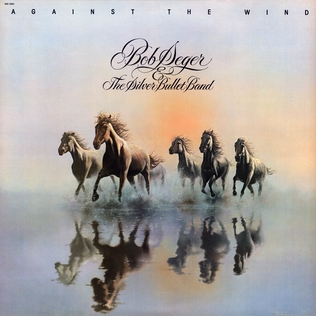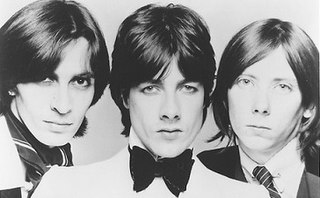
The Wild, the Innocent & the E Street Shuffle is the second studio album by American rock singer-songwriter Bruce Springsteen. It was recorded by Springsteen with the E Street Band at 914 Sound Studios, Blauvelt, New York, and released on November 5, 1973 by Columbia Records. It includes the song "Rosalita ", the band's most-used set-closing song through 1985.

Darkness on the Edge of Town is the fourth studio album by American singer-songwriter Bruce Springsteen, released on June 2, 1978. The album marked the end of a three-year gap between albums brought on by contractual obligations and legal battling with former manager Mike Appel.

The River is the fifth studio album by American singer-songwriter Bruce Springsteen. It was released on October 17, 1980, by Columbia Records. Springsteen's only double album, The River was produced by Jon Landau, Springsteen, and bandmate Steven Van Zandt. The album was Springsteen's first to go number one on the Billboard Top LPs & Tape chart and spent four weeks at the top of the charts. "The River" was nominated for Best Rock Vocal Performance at the 1982 Grammy Awards.

Toulouse Street is the second studio album by American rock band The Doobie Brothers. The album was released on July 1, 1972, by Warner Bros. Records. It was their first album with new bassist Tiran Porter and second drummer Michael Hossack to augment existing drummer John Hartman, so it meant that they now had their trademark twin-drummer sound. Toulouse Street is the name of a street in the French Quarter of New Orleans. The cover and inside centerfold photos were taken at a former brothel on Toulouse Street.

Takin' It to the Streets is the sixth studio album by American rock band The Doobie Brothers. The album was released on March 19, 1976, by Warner Bros. Records. It was the first to feature Michael McDonald on lead vocals.

Minute by Minute is the eighth studio album by American rock band The Doobie Brothers, released on December 1, 1978, by Warner Bros. Records. It was their last album to include members John Hartman and Jeff "Skunk" Baxter.

One Step Closer is the ninth studio album by American rock band The Doobie Brothers. The album was released on September 17, 1980, by Warner Bros. Records. The album included the hit "Real Love", which reached #5 on the Billboard Hot 100. This album is the band's last studio album with Michael McDonald in the lineup until 2014's Southbound.

Against the Wind is the eleventh studio album by American rock singer Bob Seger and his fourth with the Silver Bullet Band. It was released in February 1980. It is Seger's only number-one album to date, spending six weeks at the top of the Billboard Top LPs chart, knocking Pink Floyd's The Wall from the top spot.

The World Is a Ghetto is the fifth album by the band War, released in late 1972 on United Artists Records. The album attained the number one spot on Billboard, and was Billboard magazine's Album of the Year as the best-selling album of 1973. In addition to being Billboard's #1 album of 1973, the album was ranked number 444 on Rolling Stone magazine's original list of the 500 greatest albums of all time. The title track became a gold record.

The Other Side of Life is the twelfth studio album by English progressive rock band the Moody Blues, released in 1986 by Polydor Records.

Duncan John Browne was an English singer-songwriter and musician.

Ginger Baker's Air Force is the eponymous debut album by Ginger Baker's Air Force, released in 1970. This album is a recording of a sold-out live show at the Royal Albert Hall, on 15 January 1970, with the original 10-piece line up. The gatefold LP cover was designed left-handed; i.e. the front cover artwork was on what traditionally would be considered the back and vice versa.

City Lights is an album by Dr. John, his first for Horizon Records. It was released in 1978.

"Tunnel of Love" is the title song by Bruce Springsteen from his 1987 Tunnel of Love album. It was released as the second single from the album, reaching number nine on the Billboard Hot 100 chart. Like the first single from the album, "Brilliant Disguise", "Tunnel of Love" reached number one on the Mainstream Rock Tracks chart and reached the top twenty in Canada peaking at number seventeen. The music video received five MTV Video Music Awards nominations, including Video of the Year and Best Male Video.

Bruce Springsteen & The E Street Band Greatest Hits is Bruce Springsteen's fifth compilation album, released as a limited edition first in the United States, Canada and Australia on January 13, 2009, exclusively through Wal-Mart retailers.

How's Tricks is the fifth studio album by Scottish musician Jack Bruce, released in 1977 through RSO Records. It is credited to "The Jack Bruce Band".

Dedication is an album released by Gary U.S. Bonds in 1981, the first of two on which he collaborated with Bruce Springsteen & the E Street Band, the second being On the Line, released the following year, 1982. The musicians accompanying Bonds on the album include many members of the E Street Band and the Asbury Jukes. The album includes three songs written by Bruce Springsteen, one written by Steve Van Zandt, and several covers of songs from the Beatles, Bob Dylan, Jackson Browne, and others. It also features a duet between Bonds and Springsteen on the track "Jole Blon". Bonds' early 1960s sound had been a major influence on both Springsteen and Van Zandt. The songs written by Springsteen, including the cover of "Jole Blon", were originally intended for his 1980 album, The River, but he felt they fit better with Bonds and his versions of them have never been released although he has performed most of them live, often featuring Bonds as a special guest.

Metro were an English rock band, featuring Peter Godwin, Duncan Browne and Sean Lyons (guitar). The band is best known for their song "Criminal World", which was covered by David Bowie on his 1983 album, Let's Dance.

Duncan Browne is the self-titled second studio album by English singer-songwriter and musician Duncan Browne, released in 1973 through Mickie Most's Rak Records. Stylistically, the album is a continuation of Browne's folk-indebted debut album, Give Me Take You (1968), and features progressive rock and electronic music elements.

The Wild Places is the third studio album by English singer-songwriter and musician Duncan Browne. Released in 1978 through Logo and Sire Records, it is Browne's first solo album since his departure from the band Metro that year, and features contributions from session musicians Tony Hymas, John Giblin and Simon Phillips. In contrast to his previous self-titled solo record, the sound of the album is fully electric and ranges from progressive rock to straightforward rock music and synthpop.




















